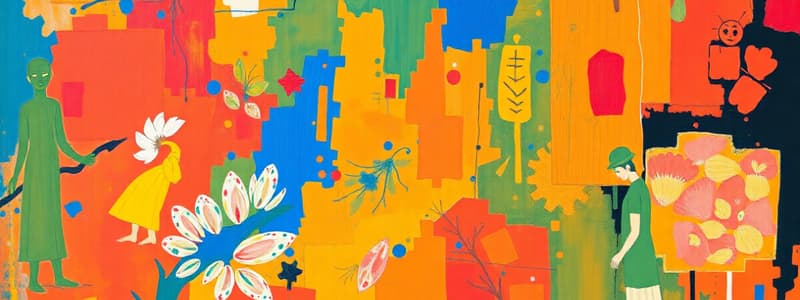Podcast
Questions and Answers
Which poet is known for blending Indian themes with Western styles?
Which poet is known for blending Indian themes with Western styles?
- Kamala Das
- Toru Dutt (correct)
- Nissim Ezekiel
- Derek Walcott
What major poetry movement focused on themes of identity and urban experience?
What major poetry movement focused on themes of identity and urban experience?
- Modernism (correct)
- Romanticism
- Surrealism
- Post-colonialism
Which of the following themes is commonly explored in Indian English poetry?
Which of the following themes is commonly explored in Indian English poetry?
- Dystopian Futures
- Science Fiction
- Mythology and Love (correct)
- Eco-criticism
Who among the following is known for her confessional style exploring womanhood and sexuality?
Who among the following is known for her confessional style exploring womanhood and sexuality?
What significant contribution does Indian English poetry make to the literary landscape?
What significant contribution does Indian English poetry make to the literary landscape?
Study Notes
Overview of Indian English Poetry
- Indian English poetry refers to poems written in English by Indian poets.
- Emerged in the late 19th century, gaining significant traction in the 20th century.
Historical Context
- Early influences from Indian vernacular traditions and colonial exposure.
- Notable early poets include:
- Toru Dutt: One of the first Indian poets in English, known for blending Indian themes with Western styles.
- Sarojini Naidu: Celebrated for her lyrical poems on nature and patriotism.
Major Movements
- Modernism: Influenced by global literary trends, focusing on themes of identity, dislocation, and urban experience.
- Post-Independence: Poets explored themes of nationalism, social issues, and personal identity.
Key Poets
- Nissim Ezekiel: Known for urban themes and irony; prominent figure in Indian English poetry.
- A.K. Ramanujan: Blended Indian culture with Western literary forms; known for his use of colloquial language.
- Kamala Das: Explored themes of womanhood, sexuality, and personal struggle; known for her confessional style.
- Derek Walcott: Focused on post-colonial identity and cultural heritage; awarded the Nobel Prize in Literature.
Themes
- Identity and belonging: Exploration of Indian identity in a global context.
- Nature and Mythology: Use of Indian myths and natural imagery.
- Social and Political Issues: Reflections on caste, gender, and societal norms.
- Love and Relationships: Personal and often confessional exploration of love.
Forms and Styles
- Varied forms ranging from traditional to free verse.
- Use of regional languages and dialects for authenticity.
- Emphasis on musicality and imagery, taking cues from both Western and Indian poetic traditions.
Impact and Significance
- Contributes to the global literary landscape by showcasing Indian perspectives.
- Reflects the diversity of Indian culture and thought.
- Influences contemporary poetry and emerging voices in the literary scene.
Overview of Indian English Poetry
- Indian English poetry consists of works written in English by Indian poets, beginning in the late 19th century and flourishing in the 20th century.
Historical Context
- Early Indian English poetry drew from vernacular traditions and was shaped by colonial exposure.
- Toru Dutt was among the first Indian poets writing in English, noted for merging Indian themes with Western poetic forms.
- Sarojini Naidu, known as the "Nightingale of India," gained recognition for her lyrical poems centered on nature and patriotism.
Major Movements
- Modernism in Indian English poetry was influenced by global literary currents, spotlighting identity, dislocation, and urban experiences.
- Post-Independence poetry shifted focus to nationalism, social issues, and the exploration of personal identity.
Key Poets
- Nissim Ezekiel: Celebrated for his urban themes, use of irony, and prominence within Indian English poetry.
- A.K. Ramanujan: Fused Indian cultural elements with Western literary styles, utilizing colloquial language effectively.
- Kamala Das: Known for her confessional poetry that examines womanhood, sexuality, and personal challenges.
- Derek Walcott: His work explores themes of post-colonial identity and cultural heritage, earning him the Nobel Prize in Literature.
Themes
- Identity and Belonging: Poets critically analyze Indian identity amid global influences.
- Nature and Mythology: Frequent incorporation of Indian mythology and vivid natural imagery.
- Social and Political Issues: Work reflects on caste, gender, and societal norms prevalent in India.
- Love and Relationships: Personal and confessional explorations of romantic themes.
Forms and Styles
- Diverse poetic forms, including traditional and free verse styles, are prevalent.
- Poets often incorporate regional languages and dialects to enhance authenticity within their works.
- A strong focus on musicality and imagery, borrowing elements from both Western and Indian poetic traditions.
Impact and Significance
- Indian English poetry contributes richly to the global literary landscape by presenting unique Indian perspectives.
- Reflects the multifaceted nature of Indian culture and intellectual thought.
- Influences contemporary poetry and supports the emergence of new voices in the literary arena.
Studying That Suits You
Use AI to generate personalized quizzes and flashcards to suit your learning preferences.
Description
Explore the rich landscape of Indian English poetry, highlighting its historical context, major movements, and key poets. Discover how Indian themes blend with Western styles and the evolution of poetry through various literary influences. This quiz will test your knowledge of significant poets like Toru Dutt, Sarojini Naidu, Nissim Ezekiel, and A.K. Ramanujan.




